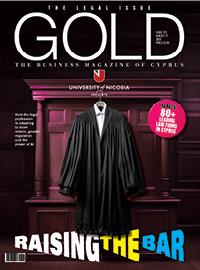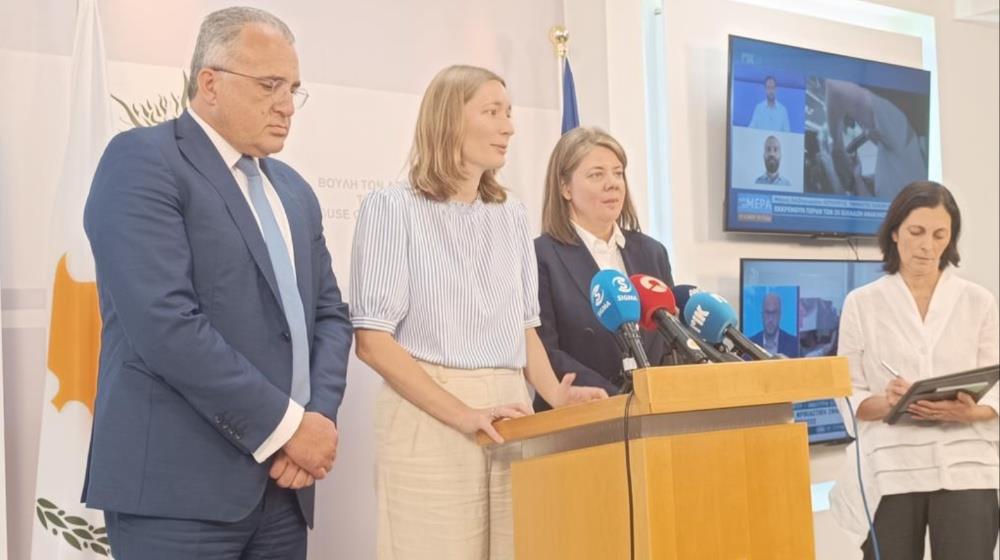The tax reform that is currently underway in Cyprus is “very interesting”, the Chair of the FISC Subcommittee delegation in Cyprus and Vice-Chair of the FISC Subcommittee, Kira Peter-Hansen said after a meeting the delegation had with the Parliamentary Committee on Finance in Nicosia.
The FISC Subcommittee is the European Parliament's Subcommittee on Tax Matters, a permanent subcommittee dedicated to EU tax policy.
In statements to the press after the 17 September meeting, Hansen also referred to tax avoidance and evasion issues, expressing satisfaction as regards the steps Cyprus has taken in this direction, such as the abolition of the golden visa and citizenship schemes.
Cyprus is fully harmonised with the European Union (EU) on tax issues, the Chair of the Parliamentary Committee on Finance, Democratic Party (DIKO) MP, Christiana Erotokritou, said on her part.
The Subcommittee was escorted by EPP MEP, Michalis Hadjipantela.
Hansen: The attempted tax reform is "very interesting"
On her part, the Chair of the FISC Subcommittee delegation in Cyprus and Vice-Chair of the FISC Subcommittee, Kira Peter-Hansen, noted that the Subcommittee is in Cyprus to understand the issues related to tax reform, to discuss cooperation issues, as well as issues related to the upcoming assumption of the Presidency of the Council of the European Union by Cyprus.
Referring to the effort for a tax reform in Cyprus, she described it as “very interesting”, adding that many discussions have already taken place with Cypriot society.
Hansen also welcomed the reform’s ambition to increase the tax rate to 15%, which is in line with both the Organisation for Economic Co-operation and Development (OECD) and European policies. She also expressed the Subcommittee’s particular interest in the issue of housing, noting that tax reform can play a role in this as well. “We also want to see its effectiveness in terms of more affordable housing, which is an issue in many European countries”, she added.
Referring to tax avoidance and evasion issues, Hansen expressed her pleasure over the steps that Cyprus has taken in this direction, such as the abolition of the golden visa and citizenship schemes. She added that there are some concerns regarding investment schemes, but expressed her belief that Cyprus will proceed with the appropriate sanctions and in full alignment with European rules.
Regarding the Non-Dom regime, the Vice-Chair of the FISC Subcommittee said that “we have discussed it and in accordance with the decision of the European Court of Justice, there is a positive decision on global access to the beneficial ownership register”. As she explained, previously in some Member States there was access to the registers concerning third-party owners, adding that this is no longer possible, following a relevant decision of the European Court of Justice.
However, under the new rules on combating the proceeds of crime, access may be granted to persons with a legitimate interest, such as journalists, members of the academic community, etc.
Finally, Kira Peter-Hansen said that the FISC Subcommittee looks forward to its cooperation with the Cyprus Presidency of the Council of the EU. “You will have a lot of topics to discuss, such as taxation issues, tobacco taxation, green taxation issues and generally guiding Europe in these turbulent times,” she pointed out.
Erotokritou: Cypriot legislation on tax evasion-money laundering fully aligned with the EU
Cyprus’ legislation regarding issues arising either from European directives or from European regulations concerning tax issues, is fully aligned with the entire legislative framework of the European Union and in particular with regard to the rules for the prevention and fight against tax evasion and money laundering, the Chair of the Parliamentary Committee on Finance, DIKO MP, Christiana Erotokritou, said.
She further stressed that Cyprus has taken huge steps and has taken all the measures in recent years to comply with and implement all European directives and regulations concerning these issues, noting that the country has also been audited by other organizations and it has indeed been established that the Republic of Cyprus is fully in line not only with the spirit but also with the letter of all European directives and regulations.
During the meeting with the FISC Subcommittee, tax issues arising at the European Union level were discussed, Erotokritou said, adding that “we as the Cypriot Parliament, as the Finance Committee, stressed that in any tax discussion at the European Union level, at the European Parliament level, we must always bear in mind that the European economy, including obviously the Cypriot economy, must not only remain competitive, but its competitiveness must be strengthened”.
At the same time, she noted that tax breaks should be provided and the lowest income groups should be helped, as well as the middle class and small and medium-sized enterprises, “which are the backbone not only of the Cypriot economy, but also of the European economy”, underlining that the concerns and expectations for strengthening small and medium-sized enterprises and the middle class are common.
Furthermore, Erotokritou expressed the view that the potential for investment in the sectors of technology, innovation and research should be strengthened, pointing out that “in this sector, the European Union, including the Republic of Cyprus, still has a long way to go so that we can equally cover this sector in relation to other competitive continents”.
Referring to the housing crisis, she noted that “finding a house is becoming a very difficult task for Cypriots, and the European Union should, with various levers and mechanisms at its disposal, help European citizens, including Cypriots, so that they can more easily secure housing.”
Speaking about the cost of energy, Erotokritou stressed that “in Cyprus, the cost of energy is disproportionately higher than in other European countries, on the one hand due to Turkey’s aggressive stance, and on the other hand due to the fact that as an isolated country we rely exclusively on fossil fuels, which makes the purchase and consumption of energy, whether electricity or motor fuels, a huge financial burden on the shoulders of the Cypriot taxpayer, which also makes their daily lives, but also their livelihood and survival even more difficult.”
In the context of the Cyprus Presidency, Christiana Erotokritou stated that the Finance Committee will highlight “the great change that has taken place in the Cypriot economy in recent years, the enormous corrective moves that the Republic of Cyprus, the Cypriot people and the Cypriot taxpayer have taken at great cost.”
“We have highlighted the legality, the correctness and the perspective that the Republic of Cyprus has to be a proper business centre for European citizens who choose the legality and transparency and fully aligned with all European directives-regulations business and investment destination,” she underlined.
At the same time, she expressed the hope that “this dialogue will continue precisely to highlight this enormous progress made by the Republic of Cyprus, but at the same time it will solve problems that concern taxpayers", such as housing and energy issues, "and will highlight the prospects that the Cypriot economy has, but also how much more constructively it can contribute to the formation of European economic tax policy".
Hadjipantela: We will try to implement the recommendations
In his statement, the European People's Party MEP, Michalis Hadjipantela, thanked his colleagues from the European Parliament, the FISC Subcommittee and the Economic and Monetary Affairs Committee, who accepted his suggestion to visit Cyprus, as well as his colleagues from the FISC Committee who a few months ago approved with a large majority his report on the simplification of the European Union's tax system.
Expressing his joy for the report of the Vice-Chair of the FISC Subcommittee on the issue of housing that is plaguing Cypriot citizens, Hadjipantela pointed out that "the European Union, the Finance Committee, understands the housing problems of our country and we will do everything possible to help them."
In conclusion, he said that the FISC Subcommittee during its two-day presence in Cyprus has heard from the Cyprus Chamber of Commerce and Industry (CCCI), the Cyprus Employers and Industrialists Federation (CEIF), accountants and lawyers some proposals regarding the simplification of the European tax system, so that Cypriot small and medium-sized companies have less bureaucracy and fewer costs. “We have heard these suggestions and we will try to implement them in Europe,” he noted.
(Source: CNA)









